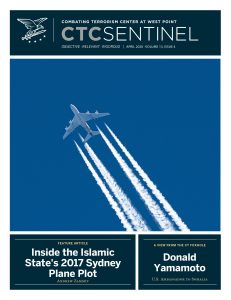From the Editor
It was one of the most ambitious and innovative international terror plots ever seen. In July 2017, Australian police arrested two brothers in Sydney who had attempted to get a bomb on board an Etihad plane flying from Sydney to Abu Dhabi carrying around 400 passengers and were separately planning to carry out a poison gas attack inside Australia with an improvised chemical dispersion device. The two brothers had been guided by Islamic State operatives in Syria, who successfully arranged for a partially constructed bomb to be air-mailed from Turkey to Australia. In our feature article, Andrew Zammit draws on “newly available information resulting from the successful prosecution of the Sydney-based plotters” to provide the most comprehensive account to date on how the plot developed and what it reveals about the evolution of the international terror threat posed by the Islamic State.
Donald Yamamoto, the United States Ambassador to Somalia, is featured in our ongoing “A View from the CT Foxhole” series. The interview was conducted by Jason Warner in front of cadets at the U.S. Military Academy at West Point.
Attacks in London in November 2019 and February 2020 by two convicted terrorists released from prison has created a surge of concern about terrorist recidivism. But Thomas Renard points out that academic research undertaken thus far suggests terrorists are unlikely to relapse into violent extremism. His review of the judiciary files of 557 jihadi terrorist convicts in Belgium, since 1990, finds that less than five percent reengaged in terrorist activities.
Drawing on nearly a dozen reporting trips to Ukraine between 2014 and 2019, Tim Lister examines the nexus between far-right extremists in Ukraine and the United States. He writes: “In recent years, some Americans and Europeans drawn to various brands of far-right nationalism have looked to Ukraine as their field of dreams: a country with a well-established, trained, and equipped far-right militia … that has been actively engaged in the conflict against Russian-backed separatists.” He notes that in some instances, “U.S.-based individuals have spoken or written about how the training available in Ukraine might assist them and others in their paramilitary-style activities at home.”
Paul Cruickshank, Editor in Chief
 Skip to content
Skip to content

